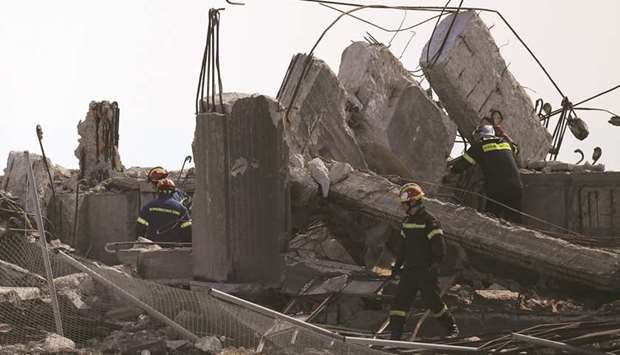A magnitude 5.1 earthquake rattled the Greek capital Athens yesterday, briefly knocking out power and telecommunications in parts of the city and sending people running from buildings in panic.
The European Earthquake Monitoring Centre (EMC) recorded the quake’s epicentre at a point 22km (14 miles) northwest of the city.
Its website quoted a witness as saying that the quake was “strong but fortunately not very long”, while another compared it to a “strong bounce” lasting about 15 seconds.
The Acropolis, a complex of ancient Greek buildings including the Parthenon located on a rocky hilltop overlooking the capital, was intact, according to the authorities.
It is one of the world’s most visited historical landmarks.
Reuters correspondents saw people evacuating buildings in the sprawling capital, and hundreds crammed into central Syntagma Square.
“It was a very intense quake, we were terrified, everyone started coming out (of the building),” a young woman named Katerina told AFP outside the six-storey cosmetics store where she works.
“It was more like an explosion,” another woman told ERT on the city’s central Syntagma Square. “We were all very afraid, so we’ll stay here for a couple of hours.”
Three people including a Belgian tourist were lightly-injured by falling debris, health ministry officials said.
In the port city of Piraeus, an abandoned structure on a port quay collapsed.
The quake occurred at a depth of 15km (9.3 miles) in an area affected by earthquakes in the past.
Greece, along with Turkey, is among the most tremor-prone regions of Europe.
“The earthquake was close to the surface, which is why it was felt so much,” seismologist Manolis Skordilis told Greece’s Star TV.
Citizens’ Protection Minister Michalis Chrysochoidis said that there had been 30 calls asking the fire brigade for help in rescuing people trapped in elevators, while some abandoned buildings were damaged.
He said the sequence of post-quake tremors was normal, which the Athens Geodynamic Institute considered to be a positive sign.
Noting that many people were likely afraid to sleep indoors, the minister said that additional police would be deployed and remain on standby for the entire weekend.
“We are here next to you, we will not leave, we will not sleep until all danger has receded ... we will overcome this together,” Chrysochoidis said in a televised statement.
Prime Minister Kyriakos Mitsotakis said the response of state services to the earthquake was satisfactory.
“We have learned to live with earthquakes, this was one more quake,” he told reporters after visiting the civil protection co-ordinating centre in Athens, a metropolis of almost 4mn people.
“The situation is gradually subsiding. The city withstood this and can handle it. There is no cause for concern,” said Nikos Hardalias, general secretary for the civil protection department.
Around 40 minutes after the first tremor, residents felt another strong quake, which the EMC rated magnitude 4.4, with an epicentre in the same region at the foot of Mount Parnitha.
In 1999, an earthquake of magnitude 5.9 in the same area killed 143 people.
In another natural disaster earlier this month, seven people died and at least 23 were injured – most of them tourists – as a fierce storm ripped through beachfronts in Halkidiki, one of Greece’s top tourist areas on July 10.

Rocks block part of a road in Aspropirgos, near Athens, following an earthquake.
